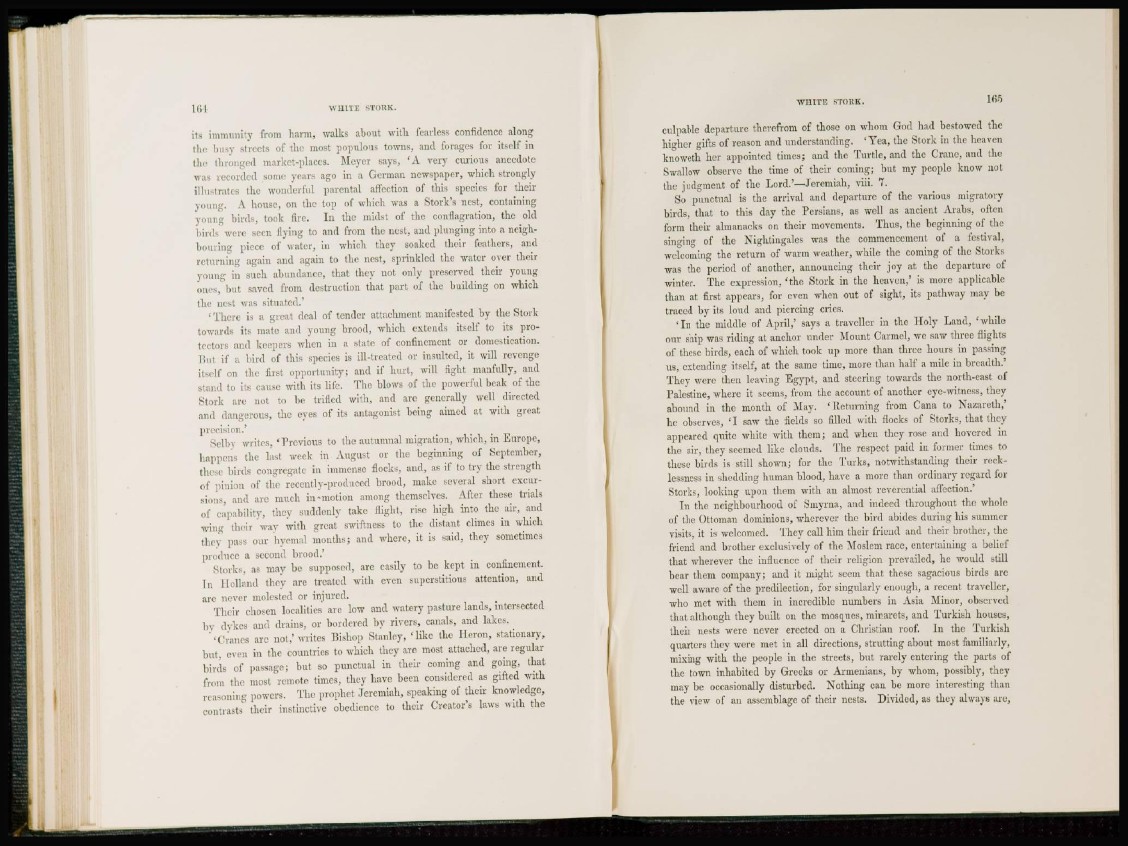
164 WHITE STORK.
its immunity from harm, walks about with fearless confidence along
the busy streets of the most populous towns, and forages for itself in
the thronged market-places. Meyer says, ' A very curious anecdote
was recorded some years ago in a German newspaper, which strongly
illustrates the wonderful parental affection of this species for their
young, A house, on the top of which was a Stork's nest, containing
young birds, took fire. In the midst of the conflagration, the old
birds were seen flying to and from the nest, and plunging into a neighbouring
piece of water, in which they soaked their feathers, and
returning again and again to the nest, sprinkled the water over their
young in such abundance, that they not only preserved their young
ones, but saved from destruction that part of the building on which
the ue^t was situated.'
' T h e r e is a great deal of tender attachment manifested by the Stork
towards its mate and young brood, which extends itself to its protectors
and keepers when in a state of confinement or domestication.
But if a bird of this species is ill-treated or insulted, it will revenge
itself on the first opportunity; and if hurt, will fight manfully, and
stand to its cause witli its life. The blows of the powerful beak of the
Stork are not to be trilled with, and arc generally well directed
and dangerous, the eyes of its antagonist being aimed at with great
precision.*
Selby writes, 'Previous to the autumnal migration, which, in Europe,
happens the last week in August or the beginning of September,
these birds congregate in immense flocks, and, as if to t ry the strength
of pinion of the recently-produced brood, make several short excursions,
and are much in-motion among themselves. After these trials
of capability, they suddenly take flight, rise high into the air, and
wing their way with great swiftness to the distant climes in which
the\ pass our hvemal mouths; and where, it is said, they sometimes
produce a second brood.'
Storks, as may be supposed, are easily to be kept in confinement.
I n Holland they are treated with even superstitious attention, and
arc never molested or injured.
Their chosen localities arc low and watery pasture lands, intersected
bv dykes and drains, or bordered by rivers, canals, and lakes.
'Cranes are n o t , ' w r i t e s Bishop Stanley, ' l i k e the Heron, stationary,
but, even in the countries to which they are most attached, are regular
birds of passage; but so punctual in their coming and going, that
from the most remote times, they have been considered as gifted with
reasoning powers. The prophet Jeremiah, speaking of then; knowledge,
contrasts their instinctive obedience to their Creator's laws with the
culpable departure therefrom of those on whom God had bestowed the
higher gifts of reason and understanding. 'Yea, the Stork in the heaven
knoweth her appointed times; and the Turtle, and the Crane, and the
Swallow observe the time of their coming; but my people know not
the judgment of the Lord.'—Jeremiah, viii. 7.
So punctual is the arrival and departure of the various migratory
birds, that to this day the Persians, as well as ancient Arabs, often
form their almanacks on their movements. Thus, the beginning of the
singing of the Nightingales was the commencement of a festival,
welcoming the return of warm weather, while the coming of the Storks
was the period of another, announcing their joy at the departure of
winter. The expression, ' t h e Stork in the heaven,' is more applicable
than at first appears, for even when out of sight, its pathway may be
traced by its loud and piercing cries.
' I n the middle of April,' says a traveller in the Holy Land, 'while
our ship was riding at anchor under Mount Carmel, we saw three flights
of these birds, each of which took up more than three hours in passing
us, extending itself, at the same time, more than half a mile in breadth.'
Thev were then leaving Egypt, and steering towards the north-cast of
Palestine, where it seems, from the account of another eye-wdtnoss, they
abound in the month of May. 'Returning from Cana to Nazareth,'
he observes, ' I saw the fields so filled with flocks of Storks, that they
appeared quite white with them; and when they rose and hovered in
the air, they seemed like clouds. The respect paid in former times to
these birds is still shown; for the Turks, notwithstanding their recklessness
in shedding human blood, have a more than ordinary regard for
Storks, looking upon them with an almost reverential affection.'
I n the neighbourhood of Smyrna, and indeed throughout the whole
of the Ottoman dominions, wherever the bird abides during his summer
visits, it is welcomed. They call him their friend and their brother, the
friend and brother exclusively of the Moslem race, entertaining a belief
that wherever the influence of their religion prevailed, he would still
bear them company; and it might seem that these sagacious birds are
weU aware of the predilection, for singularly enough, a recent traveller,
who met with them in incredible numbers in Asia Minor, observed
that although they built on the mosques, minarets, and Turkish houses,
their nests were never erected on a Christian roof. In the Turkish
quarters they were met in all directions, strutting about most familiarly,
mixing with the people in the streets, but rarely entering the parts of
the town inhabited by Greeks or Armenians, by whom, possibly, they
may be occasionally disturbed. Nothing can be more interesting than
the view of an assemblage of their nests. Divided, as they always are,